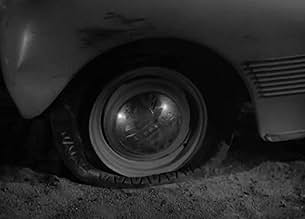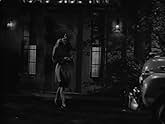Füge eine Handlung in deiner Sprache hinzuA mortally-wounded female gangster recounts how she and her gang revived an executed killer from the gas chamber to try to find out where he buried a fortune in cash.A mortally-wounded female gangster recounts how she and her gang revived an executed killer from the gas chamber to try to find out where he buried a fortune in cash.A mortally-wounded female gangster recounts how she and her gang revived an executed killer from the gas chamber to try to find out where he buried a fortune in cash.
- Regie
- Drehbuch
- Hauptbesetzung
- Margot Shelby
- (as Miss Jean Gillie)
- Tommy
- (as Phil Van Zandt)
- Chaplain
- (Nicht genannt)
- Policeman
- (Nicht genannt)
- Trucker at Roadside Inn
- (Nicht genannt)
- Kelsey
- (Nicht genannt)
- First Visitor
- (Nicht genannt)
- Driver
- (Nicht genannt)
- Georgia - Margot's Maid
- (Nicht genannt)
Empfohlene Bewertungen
Unfortunately, two things happened to railroad Gille's career - she and Bernhard divorced, and then she died of pneumonia three years after this film was made.
Tall, slender, with silky blond hair and a British accent, Gille has a formidable role here as the noir femme fatale, Margot Shelby, who will stop at nothing to find and possess $400,000 a death row killer has hidden.
To that end, she plays all ends against the middle. He plans to go to his grave with his secret, determined to be the only person who will ever spend that money. No matter how much he loves Margot, he won't tell her where it is.
Margot finds out that methylene blue is the antidote for the gas used to execute prisoners and convinces a doctor (Herbert Rudley), who works at the prison, to administer it after the execution.
Once you're dead, you're dead, except in this film, I guess. Well, somehow, the doc revives this guy, and Margot, the reluctant doctor, and her boyfriend (Edward Norris) go after the loot.
The story is told in flashback by Margot to Sergeant Portugal (Sheldon Leonard), though at the start of the film, we see the segment leading up to Margot telling her story. I actually went back and watched the beginning over.
Gille is tough as nails, and while her acting style is overt, it's perfect for this type of film. She might have enjoyed a career as a noir femme fatale in the U. S. were it not for her misfortune. Good movie, if you can buy resurrection.
Being a Monogram production, the film wears its Poverty Row status on its sleeve – with a bizarre plot (involving the re-animation of the dead: this has to be the only vintage crime outing to take the genre into the realm of sci-fi!), gritty look and second-rate cast – but which it generally manages to turn in its favor. In my review for CRIME WAVE itself, I had written how surprised I was that the film proved to be so good – this, then, came as even more of a shock (joining the ranks of such ramshackle ‘B’ noir gems as DETOUR, DILLINGER {both 1945} and GUNMAN IN THE STREETS [1950])! The film was devised as a showcase for British actress Jean Gillie by her husband, director Bernhard – however, the couple would divorce soon after and (even more sadly) Gillie herself would be dead of pneumonia in just a couple of years’ time! Still, hers is one of the most unscrupulous femme fatales ever conceived – ensnaring practically the entire male cast in her obsessive pursuit of money – and which she plays in a slightly overstated (but, under the circumstances, entirely fitting) manner.
The rest of the cast includes Edward Norris as Gillie’ crooked associate, Robert Armstrong as her ageing gangster boyfriend currently on Death Row and the only one who knows the location of a stashed cache' containing $400,000, Herbert Rudley as the small-town doctor enticed by Gillie into her unholy revivification scheme, and Sheldon Leonard as the cagey and dogged cop on their trail. Norris is somewhat stiff, while Armstrong (the original Carl Denham of “King Kong” fame) brings his typical zest to the role of love-struck and over-the-hill duped mobster – but both Rudley (bemoaning his betrayal of the code governing his profession) and Leonard (secretly enamored of Gillie himself, he’s willing to answer her plea at the moment of death to “stoop to her level”…but she just laughs in his face!) match the lady’s display of cool elegance disguising an essentially hard-boiled nature. Incidentally, Gillie’s character anticipated such celebrated noir bad girls of the ‘deadly sweet’ variety as Jane Greer in OUT OF THE PAST (1947) and Peggy Cummins (coincidentally, another British actress) in GUN CRAZY (1950) – but also Gaby Rodgers in KISS ME DEADLY (1955) in view of her similar histrionic outburst when finally laying hands on the long sought-after object of contention.
Unfortunately, it’s been revealed that the print of DECOY utilized for the DVD is slightly censored: one of the main characters is trampled no less than three times by a car which has Gillie at the wheel – however, we only get to see this once in the current version! For the record, Bernhard (whose first directorial effort this was) had been an executive at Universal – responsible for such popular ‘B’ horror outings as HORROR ISLAND and MAN-MADE MONSTER (1941; which I still haven’t managed to check out!). Finally, I’m to follow DECOY with another noir of his – the evocatively-titled BLONDE ICE (1948), via the “Special Edition” released by VCI…
Once you get past the reincarnation, the plot is fairly conventional set pieces which mostly hold up and which benefit from a honey of a twist at the end. Along the way there, we get to see greed, betrayal, spinelessness, insanity, bravery, more betrayal, submission, redemption and more Jean Gillie, whose gin blossom charm and hyena-like guffaw at once blends Richard Widmark's killing debut in KISS OF DEATH with the murderous cackle of SPECTRE in the mirrored killmaze in MAN WITH THE GOLDEN GUN. Either way, she is death and she is irresistible. As is this movie. Find it and you'll see.
Robert Armstrong's "Frank Olins" had to endure all that one day. He's the crook who has the money stashed away somewhere and "Margot Shelby" (Jean Gille) is the woman who is bound-and-determined to get it - all of it. "Frank" claims a few times that if he isn't going get the money when he gets out of jail, nobody will and those aren't words that "Margot" wants to hear! Frank knew this dame and other members of his gang, most notably "Jim Vincent" (Edward Norris) were not trustworthy.
Well, he certainly was right about "Margot." She's the femme fatale - one mean mother - who has only one thing on her mind: money. She never wants to return to her old, poor, dingy ways of her youth in small town England. Now, she's in America, part of gang and she knows how to manipulate men. Of course it helps to be extremely pretty and have a great body, which she does. She plays the men and, well.....like most noirs, the ending is not particularly a happy one for most of the characters in this story.
Personally, in this film I enjoyed seeing a lot of familiar faces from TV programs and such of the 1950s, beginning with a young Sheldon Leonard who plays the tough, pursing cop in this movie. I also thought Armstrong sounded a lot better than in his early '30s adventure stories. Speaking of sound, the music in here was ill-timed, dominating some scenes which took away from the dialog.
Make no mistake, though: this is Gilles' movie. For classic movie fans and particular film noir buffs, this is worth checking out. It's always fun to see a new "face," and that certainly applies to Gillis, whose character reminded me a bit of Peggy Cummins' one in "Gun Crazy."
I thought the ending of this film - the final minute - was especially good. So many times, you get the ending that doesn't stay true to the main character, but this one did.
Wusstest du schon
- WissenswertesMethylene blue is a real chemical compound, discovered in 1896 (by Heinrich Caro), which does indeed have the ability to counteract cyanide poisoning. This property was discovered in 1933 by Dr. Matilda Moldenhauer Brooks of San Francisco. It will not, however, restore life to those who have died from cyanide poisoning.
- PatzerWhen Joe walks into the bar, he pauses by the piano. The piano player raises his left hand off the keyboard to wave to Joe, but the piano music continues as if both his hands are still playing.
- Zitate
Sergeant Joe Portugal: Don't let that face of yours go to your head.
Margot Shelby: Or to yours?
Sergeant Joe Portugal: It wouldn't matter if did... People who use pretty faces like you use yours, don't live very long anyway.
- VerbindungenFeatured in Film Noir: Bringing Darkness to Light (2006)
Top-Auswahl
- How long is Decoy?Powered by Alexa
Details
- Laufzeit1 Stunde 16 Minuten
- Farbe
- Seitenverhältnis
- 1.33 : 1
Zu dieser Seite beitragen
































